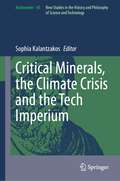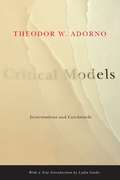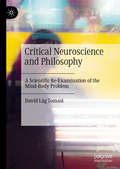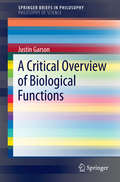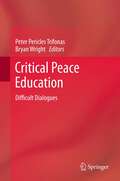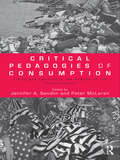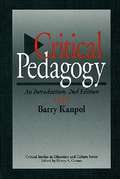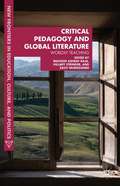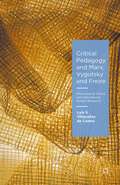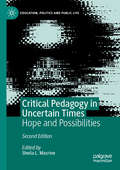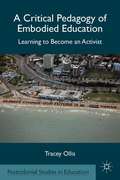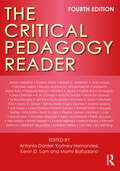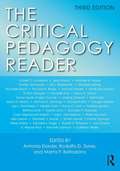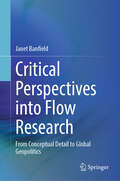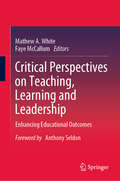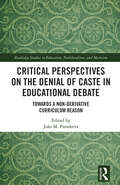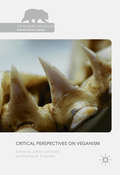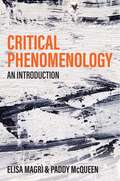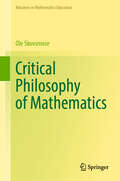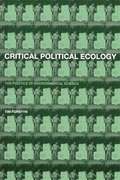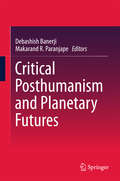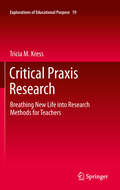- Table View
- List View
Critical Minerals, the Climate Crisis and the Tech Imperium (Archimedes #65)
by Sophia KalantzakosThis book examines the latest manifestations of resource competition. The energy transition and the digitalization of the global economy are both accelerating even as geopolitics driven by Sino-American hyper-competition become increasingly contentious. The volume brings together an interdisciplinary group of scholars, policy makers, institutional stakeholders, and industry experts to analyze not only the transition itself, but also the implications that the need for uninterrupted access to unprecedented levels of raw materials generates. By framing the challenges ahead for global society, governance, industry, international power politics, and the environment, the book asks hard questions about the choices that need to be made to reach net zero by mid-century. Moreover, it sheds light on different facets of the growing risks to what have been global interdependent supply chains in a way that is nuanced, balanced, and practical, thus pushing back on some of the most sensational headlines that breed confusion and may lead policymakers to make more narrow and less effective decisions. The volume is an outcome of “Rich Rocks, the Climate Crisis and the Tech-imperium” a Summer Institute at Caltech and the Huntington that took place in July 2021.
Critical Models: Interventions and Catchwords (European Perspectives: A Series in Social Thought and Cultural Criticism)
by Theodor W. AdornoCritical Models combines into a single volume two of Adorno's most important postwar works — Interventions: Nine Critical Models (1963) and Catchwords: Critical Models II (1969). Written after his return to Germany in 1949, the articles, essays, and radio talks included in this volume speak to the pressing political, cultural, and philosophical concerns of the postwar era. The pieces in Critical Models reflect the intellectually provocative as well as the practical Adorno as he addresses such issues as the dangers of ideological conformity, the fragility of democracy, educational reform, the influence of television and radio, and the aftermath of fascism. This new edition includes an introduction by Lydia Goehr, a renowned scholar in philosophy, aesthetic theory, and musicology. Goehr illuminates Adorno's ideas as well as the intellectual, historical, and critical contexts that shaped his postwar thinking.
Critical Models: Interventions and Catchwords
by Theodor W. Adorno Henry W. PickfordCritical Models combines into a single volume two of Adorno's most important postwar works -- Interventions: Nine Critical Models (1963) and Catchwords: Critical Models II (1969). Written after his return to Germany in 1949, the articles, essays, and radio talks included in this volume speak to the pressing political, cultural, and philosophical concerns of the postwar era.
Critical Neuroscience and Philosophy: A Scientific Re-Examination of the Mind-Body Problem
by David Låg TomasiThis book presents an analysis of the correlation between the mind and the body, a complex topic of study and discussion by scientists and philosophers. Drawing largely on neuroscience and philosophy, the author utilizes the scientific method and incorporates lessons learned from a vast array of sources. Based on the most recent cutting-edge scientific discoveries on the Mind-Body problem, Tomasi presents a full examination of multiple fields related to neuroscience. The volume offers a scientist-based and student-friendly journey into medicine, psychology, artificial intelligence, embodied cognition, and social, ecological and anthropological models of perception, to discover our truest self.
A Critical Overview of Biological Functions (SpringerBriefs in Philosophy)
by Justin GarsonThis book is a critical survey of and guidebook to the literature on biological functions. It ties in with current debates and developments, and at the same time, it looks back on the state of discourse in naturalized teleology prior to the 1970s. It also presents three significant new proposals. First, it describes the generalized selected effects theory, which is one version of the selected effects theory, maintaining that the function of a trait consists in the activity that led to its differential persistence or reproduction in a population, and not merely its differential reproduction. Secondly, it advances "within-discipline pluralism" (as opposed to between-discipline pluralism) a new form of function pluralism, which emphasizes the coexistence of function concepts within diverse biological sub-disciplines. Lastly, it provides a critical assessment of recent alternatives to the selected effects theory of function, namely, the weak etiological theory and the systems-theoretic theory. The book argues that, to the extent that functions purport to offer causal explanations for the existence of a trait, there are no viable alternatives to the selected effects view. The debate about biological functions is still as relevant and important to biology and philosophy as it ever was. Recent controversies surrounding the ENCODE Project Consortium in genetics, the nature of psychiatric classification, and the value of ecological restoration, all point to the continuing relevance to biology of philosophical discussion about the nature of functions. In philosophy, ongoing debates about the nature of biological information, intentionality, health and disease, mechanism, and even biological trait classification, are closely related to debates about biological functions.
Critical Peace Education: Difficult Dialogues (Routledge Research In Education)
by Bryan Wright Peter Pericles TrifonasForward-thinking pedagogues as well as peace researchers have, in recent decades, cast a critical eye over teaching content and methodology with the aim of promulgating notions of peace and sustainability in education. This volume gives voice to the reflections of educational theorists and practitioners who have taken on the task of articulating a 'curriculum of difference' that gives positive voice to these key concepts in the pedagogical arena. Here, contributors from around the world engage with paradigm-shifting discourses that reexamine questions of ontology and human subjectivity--discourses that advocate interdisciplinarity as well as the reformulation of epistemological boundaries. Deconstructing the origins and limits of human knowledge and learning, the book affords educators the opportunity to identify and express common elements of the subjects taught and studied in educational institutions, elements that facilitate students' apprehension of peace and sustainability. With penetrating analysis of contemporary issues in the field, this volume introduces a range of fresh theoretical approaches that extend the boundaries of peace education, which is broadly defined as promoting the responsible, equitable and sustainable co-existence of differing human communities. In doing so, the chapters show how we can improve our lives as well as our chances of survival as a species by acknowledging the importance of shared human aspirations that cut across borders, of genuinely listening to alternative voices and opinions, of challenging the ubiquitous, socially constructed historical narratives that define human relations only in terms of power. Charged with vitality and originality, this new publication is a critical examination of issues central to the development and utility of global education.
Critical Pedagogies of Consumption: Living and Learning in the Shadow of the "Shopocalypse" (Sociocultural, Political, and Historical Studies in Education)
by Jennifer A. Sandlin Peter McLaren"Utopian in theme and implication, this book shows how the practices of critical, interpretive inquiry can help change the world in positive ways…. This is the promise, the hope, and the agenda that is offered."--Norman K. Denzin, From the Foreword "Its focus on learning, education and pedagogy gives this book a particular relevance and significance in contemporary cultural studies. Its impressive authors, thoughtful structuring, wide range of perspectives, attention to matters of educational policy and practice, and suggestions for transformative pedagogy all provide for a compelling and significant volume."--H. Svi Shapiro, University of North Carolina–Greensboro Distinguished international scholars from a wide range of disciplines (including curriculum studies, foundations of education, adult education, higher education, and consumer education) come together in this book to explore consumption and its relation to learning, identity development, and education. Readers will learn about a variety of ways in which learning and education intersect with consumption. This volume is unique within the literature of education in its examination of educational sites – both formal and informal – where learners and teachers are resisting consumerism and enacting a critical pedagogy of consumption.
Critical Pedagogy: An Introduction (2nd Edition) (Critical Studies in Education and Culture Series)
by Barry KanpolCritical pedagogy refers to the means and methods of testing and attempting to change the structures of schools that allow inequities. It is a cultural-political tool that takes seriously the notion of human differences, particularly those related to race, class, and gender. Critical pedagogy seeks to release the oppressed and unite people in a shared language of critique, struggle, and hope, to end various forms of human suffering. In this revised edition, Kanpol takes the pre- and in-service educators along some initial steps to becoming critical pedagogists. As before, university professors and public school teachers alike will learn how to address their own prophetic commitments to belief and faith in the fight against despair, institutional chaos, oppression, death of spirit, and exile.
Critical Pedagogy And Global Literature
by Masood Ashraf Raja Hillary Stringer Zach VandezandeIn one volume, this edited collection provides both a theoretical and praxis-driven engagement with teaching world literature, focusing on various aspects of critical pedagogy. Included are nine praxis-driven essays by instructors who have taught world literature courses at the university level.
Critical Pedagogy and Marx, Vygotsky and Freire: Phenomenal Forms and Educational Action Research
by Luis S. Villacañas de CastroThis book explores Marx's theory of the phenomenal forms in relation to critical pedagogy and educational action research, arguing that phenomenal forms pose a pedagogical obstacle to any endeavour that seeks to expand an individual's awareness of the larger social whole.
Critical Pedagogy in Uncertain Times
by Sheila L. MacrineThis book brings together the most important figures in the evolution of Critical Pedagogy to provide comprehensive analyses of issues related to the struggle against the forces of neoliberalism and the imperial-induced privatization, not just in education, but in all of social life through the radical democratizing forces of critical pedagogy.
Critical Pedagogy in Uncertain Times: Hope And Possibilities (Education, Politics And Public Life Series)
by Sheila L. MacrineThis edited volume, now in its second edition, brings together the some of the most important figures in the evolution of Critical Pedagogy and a number of up-and-coming scholars. Together they provide comprehensive analyses related to the struggles against the triangulation of Neoliberalism, Conservatism, and Nationalism, not just in education but in all of social life, through the democratizing forces of critical pedagogy. Its re-release coincides with the 50th anniversary of the publication of Paulo Freire’s landmark publication, Pedagogy of the Oppressed. The second edition has been updated with a majority of new chapters to address the current political shifts that have hastened erosion of the public sphere and public education today. These critical pedagogues show how neoliberal attacks can be collectively resisted, challenged, and eradicated especially by those of us teaching in schools and universities.
Critical Pedagogy in Uncertain Times: Hope and Possibilities (Education, Politics and Public Life)
by Sheila L. MacrineThis edited volume, now in its second edition, brings together the some of the most important figures in the evolution of Critical Pedagogy and a number of up-and-coming scholars. Together they provide comprehensive analyses related to the struggles against the triangulation of Neoliberalism, Conservatism, and Nationalism, not just in education but in all of social life, through the democratizing forces of critical pedagogy. Its re-release coincides with the 50th anniversary of the publication of Paulo Freire’s landmark publication, Pedagogy of the Oppressed. The second edition has been updated with a majority of new chapters to address the current political shifts that have hastened erosion of the public sphere and public education today. These critical pedagogues show how neoliberal attacks can be collectively resisted, challenged, and eradicated especially by those of us teaching in schools and universities.
A Critical Pedagogy of Embodied Education
by Tracey OllisExplores the differences and similarities between two groups: lifelong activists who have been engaged in campaigns and socials movements over many years and circumstantial activists, those protestors who come to activism due to a series of life circumstances. Outlines the pedagogy of activism and the process of learning to become an activist.
The Critical Pedagogy Reader
by Antonia Darder Kortney Hernandez Kevin D. Lam Marta BaltodanoSince its publication, The Critical Pedagogy Reader has firmly established itself as the leading collection of classic and contemporary essays by the major thinkers in the field of critical pedagogy. While retaining its comprehensive introduction, this thoroughly revised fourth edition includes updated section introductions, expanded bibliographies, and up-to-date classroom questions. The book is arranged topically around such issues as class, racism, gender/sexuality, language and literacy, and classroom issues for ease of usage and navigation. New reading selections cover topics such as youth activism, agency and affect, and practical implementations of critical pedagogy. Carefully attentive to both theory and practice, this new edition remains the definitive source for teaching and learning about critical pedagogy.
The Critical Pedagogy Reader (Third Edition)
by Antonia Darder Rodolfo D. Torres Marta P. BaltodanoFor fifteen years, The Critical Pedagogy Reader has established itself as the leading collection of classic and contemporary essays by the major thinkers in the field of critical pedagogy. While retaining its comprehensive introduction, this thoroughly revised third edition includes updated section introductions, expanded bibliographies, and up-to-date classroom questions. The book is arranged topically around issues such as class, racism, gender/sexuality, critical literacies, and classroom issues, for ease of usage and navigation. New to this edition are substantive updates to the selections of contemporary readings, including pieces that reflect issues such as immigrant and refugee students, the role of social justice in teacher education, and an emphasis on practical elements of pedagogy, as well as it significance to forging democratic life. Carefully attentive to theory and practice, this much-anticipated third edition remains the definitive, foundational source for teaching and learning about critical pedagogy.
Critical Perspectives into Flow Research: From Conceptual Detail to Global Geopolitics
by Janet BanfieldThis book breaks down barriers between disciplines engaging with flow, by speaking from geography into psychology to establish geographical foundations for this psychological phenomenon. It frames and works with the multiple contradictions within the extant literature as productive rather than prohibitive, thereby encouraging collaboration across discrepancies as well as across disciplines. It incorporates new materials and perspectives to research on flow, including aesthetic theory, new materialism, more-than-human geographies, and critical development geographies to broaden the theoretical and empirical landscape of future flow scholarship. It also digs more deeply into pre-existing areas of interest within flow research than has been done before, for example, with respect to ‘dark’ flow, ‘flowability’ and (tele)presence, to facilitate more nuanced engagement with such terms. It takes a step back from the detailed empirical work that characterizes most current flow research to pose questions as to how such divergent, even contradictory, findings can emerge from scholarship on a supposedly universal experience that is purportedly robustly constructed, and whether this contrariness is necessarily problematic or emblematic of flow itself and therefore worthy of conceptual elaboration. Finally, it evokes global scale and long-term critical perspectives on the future evolution of flow to counteract the presentism within existing work that emphasizes immediate gains (e.g., performance, wellbeing, profit), in an attempt to pre-empt the worst ramifications of the progressive commodification and strategization of flow. This innovative book is of interest to scholars from a range of fields, from psychology, to business and human resource management, leisure studies, and critical human geography.
Critical Perspectives on Teaching, Learning and Leadership: Enhancing Educational Outcomes
by Mathew A. White Faye McCallumThis book addresses the significant problems that can arise for pre-service teachers, teachers and school leaders who are unprepared for the complexities of 21st century teaching. It focuses on major factors impacting teacher preparation during an era of significant change, including student learning, academic growth, classroom practice, and the efficacy of teachers. In turn, the book considers crucial aspects that can enhance educational outcomes and investigates questions including what impact the changing nature of teachers’ work has on teacher preparation; how educators can evaluate blended learning; and what impact teachers have on learners. This book provides evidence-based approaches that can be used to achieve a positive impact on education and narrow the gap in contemporary and emerging global topics in education.
Critical Perspectives on the Denial of Caste in Educational Debate: Towards a Non-derivative Curriculum Reason (Routledge Studies in Education, Neoliberalism, and Marxism)
by João M. ParaskevaThis volume represents the first exploration of caste in the field of curriculum studies, challenging the ongoing silence around the issue of caste in education and curriculum theory. Presenting comprehensive critical examination of caste as a category of domination and oppression in the colonial power matrix, chapters confront Eurocentric educational epistemologies which deny the existence and influence of caste. The book examines the impact of such silence in educational policy, praxis, and curriculum, and draws from leading scholars to illustrate the fluidity of power and oppression in the caste system. By challenging historical, cultural, and institutional origins of caste and foregrounding perspectives from outside Western epistemological frameworks, the book pioneers a critical approach to integrating caste in educational debate to interrupt social and cognitive injustices. In so doing so, the volume advocates for an alternative, non-derivative curriculum reason, through an itinerant curriculum theory as a path toward the emergence of a critical Dalit educational theory. As such, it makes a vital contribution for scholars and researchers looking to refine and enhance their knowledge of curriculum studies by highlighting the importance of theorizing caste in the role of education.
Critical Perspectives on Veganism (The Palgrave Macmillan Animal Ethics Series)
by Jodey Castricano Rasmus R. SimonsenThis book examines the ethics, politics and aesthetics of veganism in contemporary culture and thought. Traditionally a lifestyle located on the margins of western culture, veganism has now been propelled into the mainstream, and as agribusiness grows animal issues are inextricably linked to environmental impact as well as to existing ethical concerns. This collection connects veganism to a range of topics including gender, sexuality, race, the law and popular culture. It explores how something as basic as one’s food choices continue to impact on the cultural, political, and philosophical discourse of the modern day, and asks whether the normalization of veganism strengthens or detracts from the radical impetus of its politics. With a Foreword by Melanie Joy and Jens Tuidor, this book analyzes the mounting prevalence of veganism as it appears in different cultural shifts and asks how veganism might be rethought and re-practised in the twenty-first century.
Critical Phenomenology: An Introduction
by Elisa Magrì Paddy McQueenPhenomenology is one of the leading movements in twentieth-century philosophy and continues to exert a strong influence on many contemporary philosophical traditions and investigations. In recent years, phenomenological insights have been increasingly developed in relation to philosophy of illness, disability, race, gender, sexuality, and politics, leading to the emergence of critical phenomenology as a new, prominent field for interdisciplinary research. Magrì and McQueen's Critical Phenomenology: An Introduction is the first book of its kind, addressing the critical questions at the core of both classical and contemporary phenomenology. This book provides a concise, accessible introduction to key areas of phenomenological research, such as intersubjectivity, bodily experience, race, gender, social experience, and political action. In doing so, it demonstrates both the rich history of phenomenology and its continuing philosophical and ethical importance. This textbook will be essential reading for undergraduate philosophy students and academics interested in critical phenomenology.
Critical Philosophy of Mathematics (Advances in Mathematics Education #15)
by Ole SkovsmoseThis book provides a philosophy of mathematics that resonates with critical mathematics education. It draws attention to the social complexities that characterise the period of Modernity including the extreme exploitation of manual workers and their families, brutal forms of colonisations, trading of slaves, and the formation of racist ideologies. It portrays Modernity as a period of contradictions and highlights that mathematics is a part of these contradictions. The text interprets mathematics as being indefinite, seeing that mathematics is a part of the ongoing human constructions. It outlines a performative interpretation of mathematics, portraying mathematics as intrinsically connected to actions. Any kind of action, including mathematics-based actions, calls for ethical considerations and this leads to any mathematical practice, either in research, application, or education, to face ethical challenges. It illustrates with examples how a critical philosophy of mathematics can come to be an integral part of classroom practices.
Critical Political Ecology: The Politics of Environmental Science
by Timothy ForsythCritical Political Ecology brings political debate to the science of ecology. As political controversies multiply over the science underlying environmental debates, there is an increasing need to understand the relationship between environmental science and politics. In this timely and wide-ranging volume, Tim Forsyth uses an innovative approach to apply political analysis to ecology, and demonstrates how more politicised approaches to science can be used in environmental decision-making.Critical Political Ecology examines:*how social and political factors frame environmental science, and how science in turn shapes politics*how new thinking in philosophy and sociology of science can provide fresh insights into the biophysical causes and impacts of environmental problems*how policy and decision-makers can acknowledge the political influences on science and achieve more effective public participation and governance.
Critical Posthumanism and Planetary Futures
by Makarand R. Paranjape Debashish BanerjiThis volume is a critical exploration of multiple posthuman possibilities in the 21st century and beyond. Due to the global engagement with advanced technology, we are witness to a species-wise blurring of boundaries at the edge of the human. On the one hand, we find ourselves in a digital age in which human identity is being transformed through networked technological intervention, a large part of our consciousness transferred to "smart" external devices. On the other hand, we are assisted---or assailed---by an unprecedented proliferation of quasi-human substitutes and surrogates, forming a spectrum of humanoids with fuzzy borders. Under these conditions, critical posthumanism asks, who will occupy and control our planet: Will the "superhuman" merely serve as another sign under which new regimes of dominance are spread across the earth? Or can we discover or invent technologies of existence to counter such dominance? It is issues such as these which are at the heart of this new volume of explorations of the posthuman. The essays in this volume offer leading-edge thought on the subject, with special emphases on postmodern and postcolonial futures. They engage with questions of subalternity and feminism vis-#65533;-vis posthumanism, dealing with issues of subjugation, dispensability and surrogacy, as well as the possibilities of resistance, ethical politics or subjective transformation from South Asian archives of cultural and spiritual practice. This volume is a valuable addition to the on-going global dialogues on posthumanism, indispensable to those, from across several disciplines, who are interested in postcolonial and planetary futures.
Critical Praxis Research: Breathing New Life into Research Methods for Teachers (Explorations of Educational Purpose #19)
by Tricia M. KressCritical Praxis Research (CPR) is a teacher research methodology designed to bridge the divide between practitioner and scholar, drawing together many strands to explain the research process not just as something teacher researchers do, but as a fundamental part of who teacher researchers are. Emphasizing the researcher over the method, CPR embraces and amplifies the skills and passions teachers naturally bring to their research endeavours. Emerging from the tradition of critical pedagogy, Critical Praxis Research: Breathing New Life into Research Methods for Teachers transcends longstanding debates over quantitative vs. qualitative and scholar vs. practitioner research. The text examines the histories and current applications of common methodologies and re-conceptualizes the ways that these methodologies can be used to enhance teachers' identities as practitioners and researchers. It also provides a critical examination of the role of Institutional Review Boards, and explores the complexity and ethics of data collection, data analysis, and writing. Through guiding questions and writing prompts, the author encourages readers to think through the process of design and conducting CPR. The text is theoretically rich, but written in an accessible style infused with metaphor, irony, and humour. Critical Praxis Research: Breathing New Life into Research Methods for Teachers is both instructive and uplifting, sending the message that research is difficult but also joyful, like life itself.
